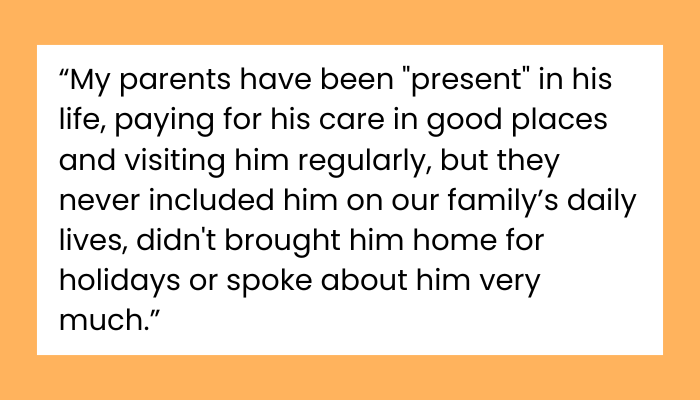Man Finds Out He’s Got a Secret Disabled Brother Refuses to Step In, and His Sister Says He’s Heartless
This story starts with a shocking family revelation. The OP (21M) grew up thinking he only had one sibling — his twin sister. But when they both turned 15, their parents dropped a life-altering bombshell: they had an older brother, now 24, who had been kept in a care facility his entire life due to a severe neurocognitive disorder. The brother functions mentally like a toddler, is fully dependent on caretakers, and can’t live independently.
Their parents had always paid for his care and visited him regularly but never brought him home for holidays or introduced him into their daily life. He was essentially a secret — even extended family only vaguely knew he existed. The parents had intentionally shielded the twins from this reality, thinking they weren’t ready for it.
When OP found out, he was initially shocked but ultimately detached. He didn’t form an emotional connection and chose not to visit or be involved. His twin sister, however, took a different route — she started visiting him with their parents and formed her own quiet bond with her disabled brother. Still, the relationship is more symbolic than emotional; he can’t communicate meaningfully or recognize them as siblings.
Imagine thinking your family life is perfectly normal, only to discover that there’s a whole sibling you never knew existed

Until age 15, the author believed he only had a twin sister, but his parents revealed an older brother with a severe neurocognitive disorder who had been living in care facilities
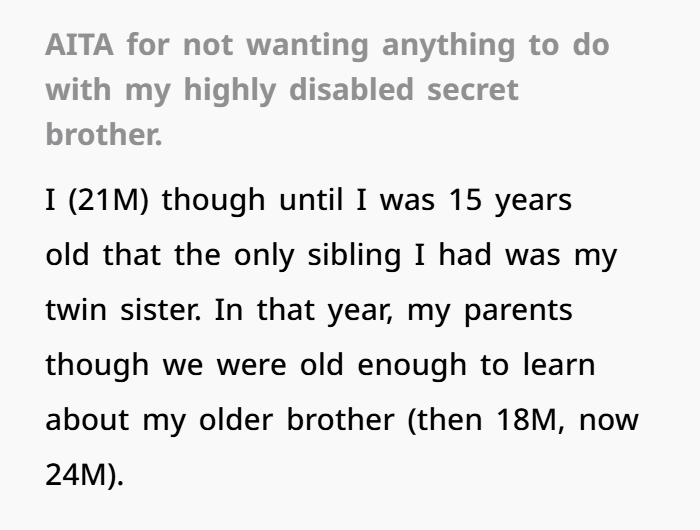
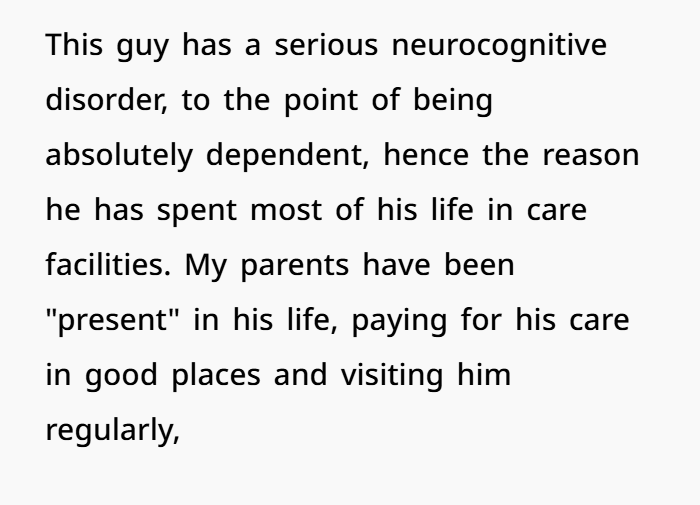
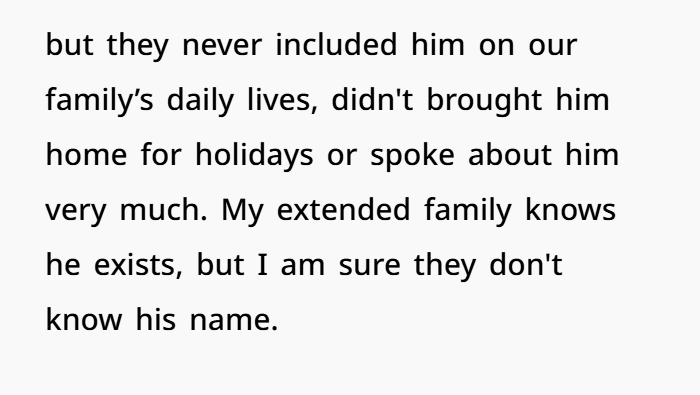
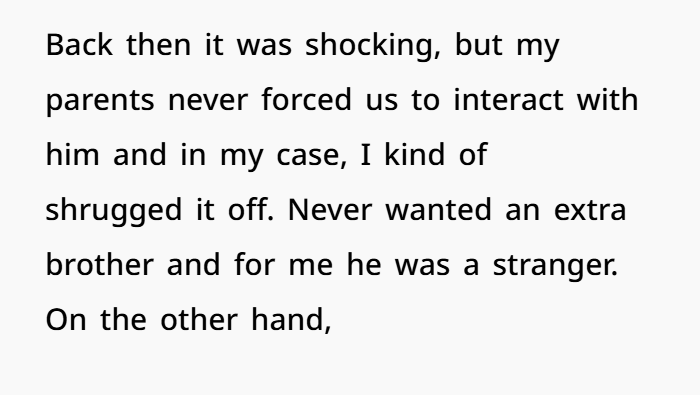
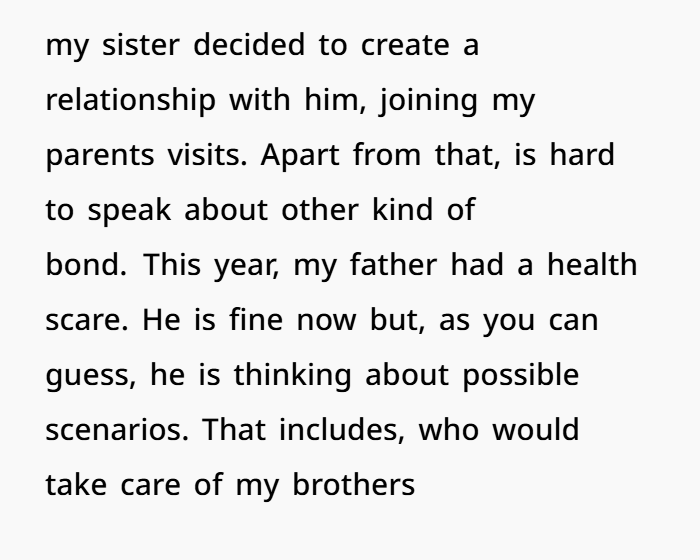
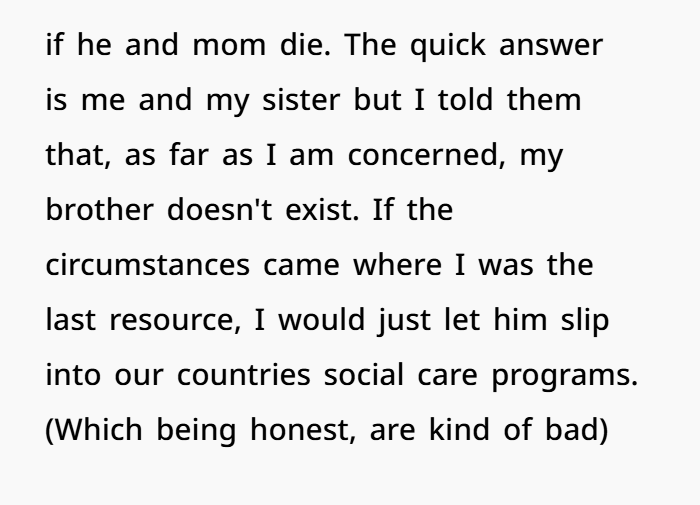
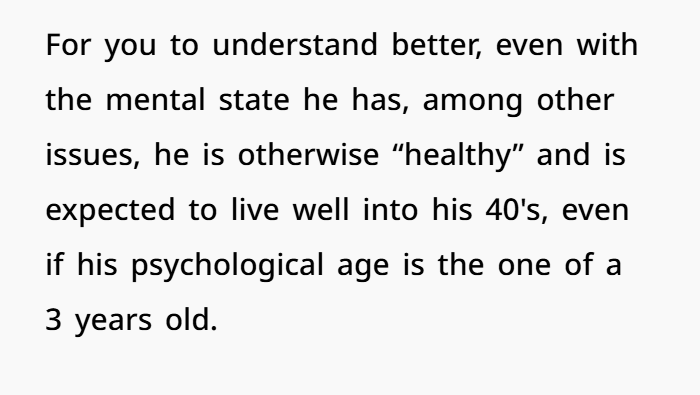
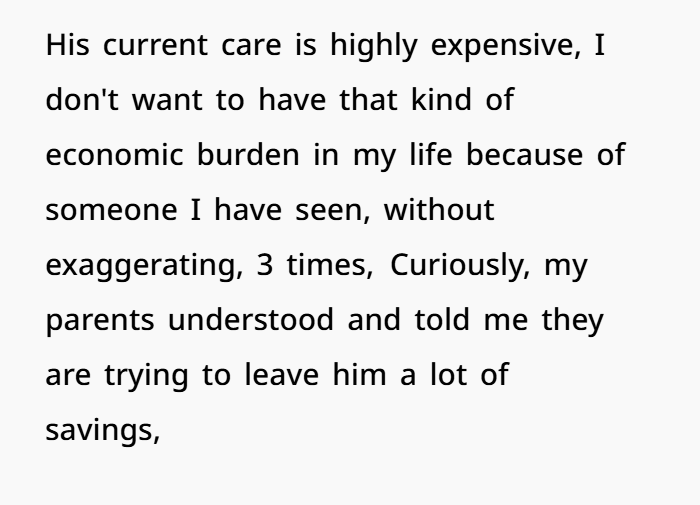
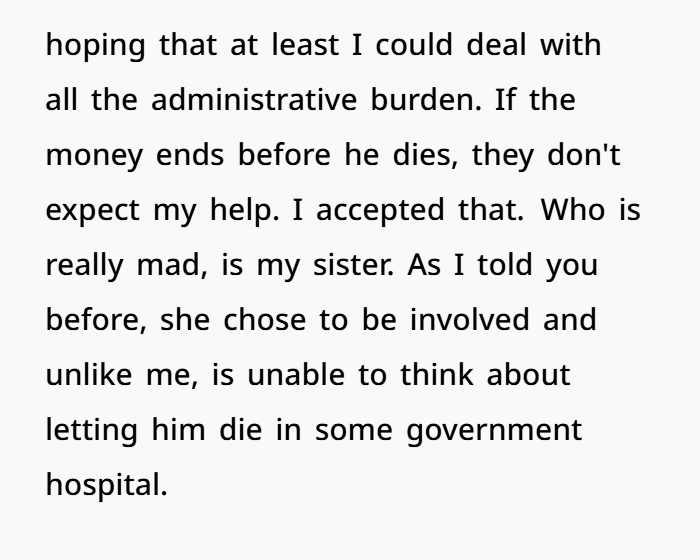

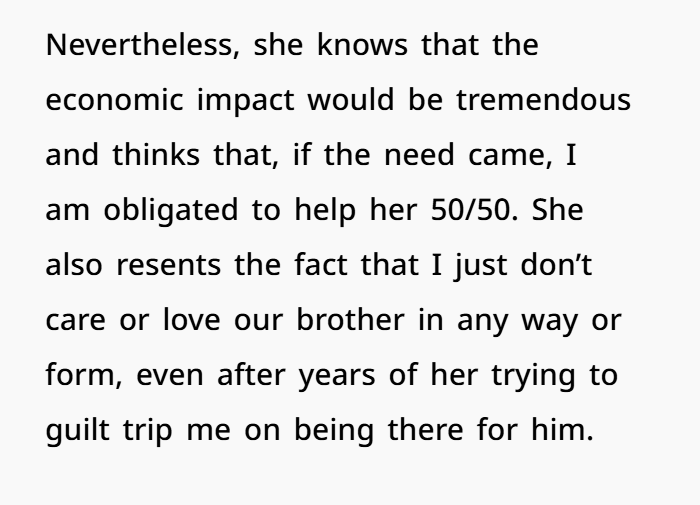
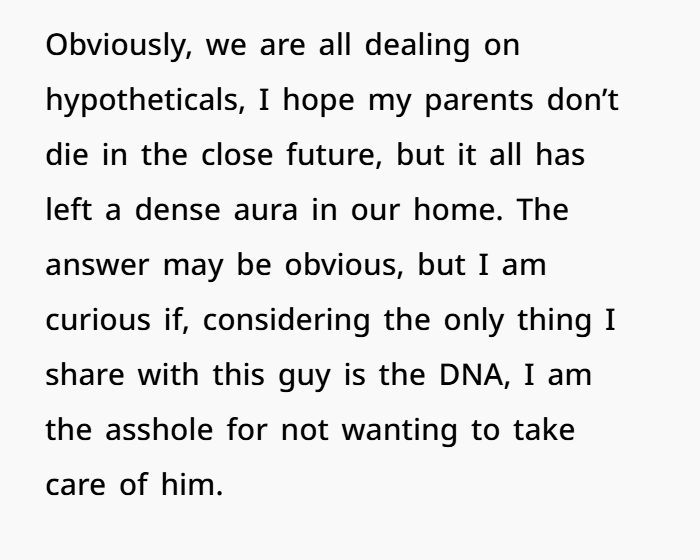
This story dives into one of the hardest moral debates out there — what do you owe a family member you never asked for? Especially one who’s completely dependent, but whom your parents deliberately kept away from you your entire life. It’s messy, emotional, and ethically gray.
Let’s unpack the key sides.
1. Family duty vs personal autonomy
Family loyalty is one of those deeply ingrained values — we’re taught from childhood that “family takes care of family.” But that idea becomes complicated when family bonds don’t actually exist. OP didn’t grow up with his brother, didn’t know his name until age 15, and was never given a chance to form a connection.

His parents intentionally separated their lives. They didn’t integrate the brother into the household, never involved him in holidays or milestones, and barely spoke of him. That’s not OP’s fault. That’s a family system that erased a person’s existence from daily life. So it’s unfair to now say, “He’s your responsibility.”
Morally, one could argue compassion should come first. But legally, OP has zero duty to take care of his disabled sibling. Adults aren’t required by law in most countries to become guardians or pay for a sibling’s care unless they voluntarily agree. The legal responsibility falls on the parents or the estate they leave behind.
So OP isn’t breaking any rule or law. He’s just being clear about boundaries early.
2. The burden of lifelong care
Let’s be real — full-time care for someone with severe neurocognitive disabilities is massively expensive and emotionally draining. According to data from the CDC and caregiving organizations, long-term institutional care for a dependent adult can cost anywhere from $60,000 to $120,000 per year, depending on the country and level of support needed. Even managing the administrative part — overseeing doctors, facilities, and government aid — can become a second full-time job.
Caregiver burnout isn’t just physical fatigue — it’s emotional collapse. Many people who take care of disabled relatives experience depression, resentment, and guilt, especially if they never wanted the role. OP knows that burden and is setting a boundary early before resentment builds.
That’s not cruelty — it’s self-preservation.
3. The hidden resentment toward the parents
One subtle thing here is that OP’s detachment is a product of his parents’ decision, not his own. They made a conscious choice to hide the brother, presumably to protect their younger children from trauma. But that decision also erased any sense of siblinghood or shared identity.
Now, suddenly, they’re turning around and asking for lifelong commitment to a person they framed as a secret. It’s emotionally unfair.
Parents sometimes use guilt as currency — expecting their children to clean up emotional or logistical messes they created. But guilt isn’t love. You can’t manufacture a sibling bond at 21 after two decades of silence.
4. The sister’s guilt and moral lens
The sister’s reaction is understandable. She’s emotionally invested. She’s visited their brother, she feels empathy for him, and she’s already accepted him as part of her life. That’s admirable. But her compassion doesn’t automatically make OP’s detachment wrong.

Her frustration likely comes from emotional projection — she feels guilty for her brother’s situation and wants to spread that responsibility, so she doesn’t have to bear it alone.
Many siblings of disabled individuals experience this internal conflict. They feel obligated to step in after their parents, even when it’s not what they want. It’s noble but often unsustainable.
In this case, OP’s sister chose that emotional connection; OP didn’t. Trying to coerce him into sharing her sense of duty crosses into manipulation territory.
5. The uncomfortable truth about “inherited responsibility”
This story highlights a taboo truth: you don’t inherit your parents’ choices. They decided to have three kids. They decided to keep one in care. They decided to conceal that fact. Those were their choices — not OP’s.
So expecting him to sacrifice decades of his life and a massive portion of his future income for a brother he never bonded with is simply unrealistic.
It’s the parents’ job to financially plan for a dependent child’s future — through trusts, insurance, or savings. And, to their credit, OP’s parents seem to be doing exactly that. They’re not demanding he fund anything — just that he handle some paperwork when the time comes. That’s fair and pragmatic.
6. Compassion vs obligation
Some readers might argue: “But what about empathy? He’s still your brother.” And they’re right — empathy matters. But empathy doesn’t mean total sacrifice. You can feel sorry for someone and still recognize that you’re not equipped — financially, emotionally, or logistically — to handle their care.
7. What could a fair compromise look like?
In practical terms, OP could agree to be an administrative guardian — managing documents, making sure his brother’s care fund is spent properly, and ensuring he’s not neglected. That’s not the same as being a daily caregiver or financial provider.
That’s the middle ground between total detachment and total sacrifice — compassion with boundaries.
Netizens leaned toward seeing the author as understandably conflicted rather than morally wrong, as they insisted he had no obligation to take care of his brother
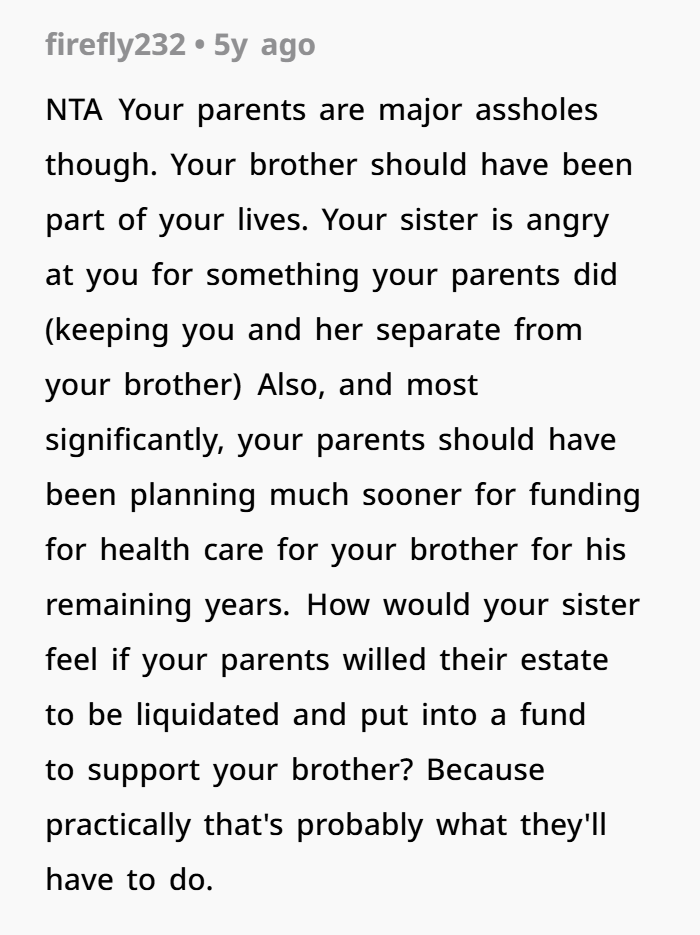
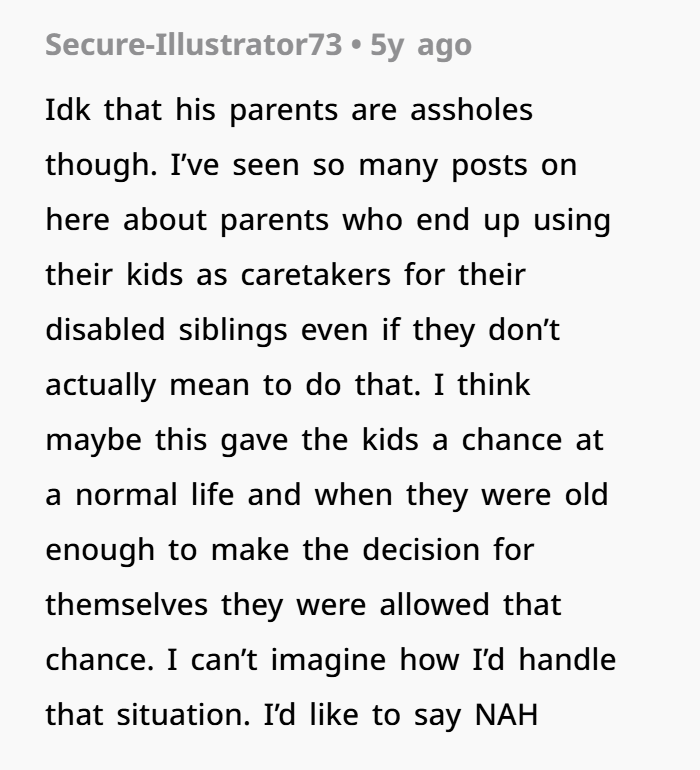
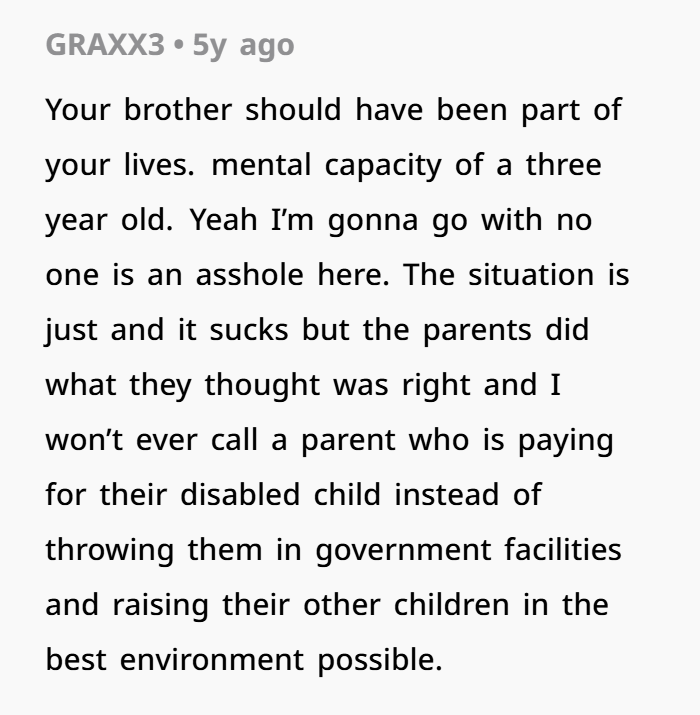
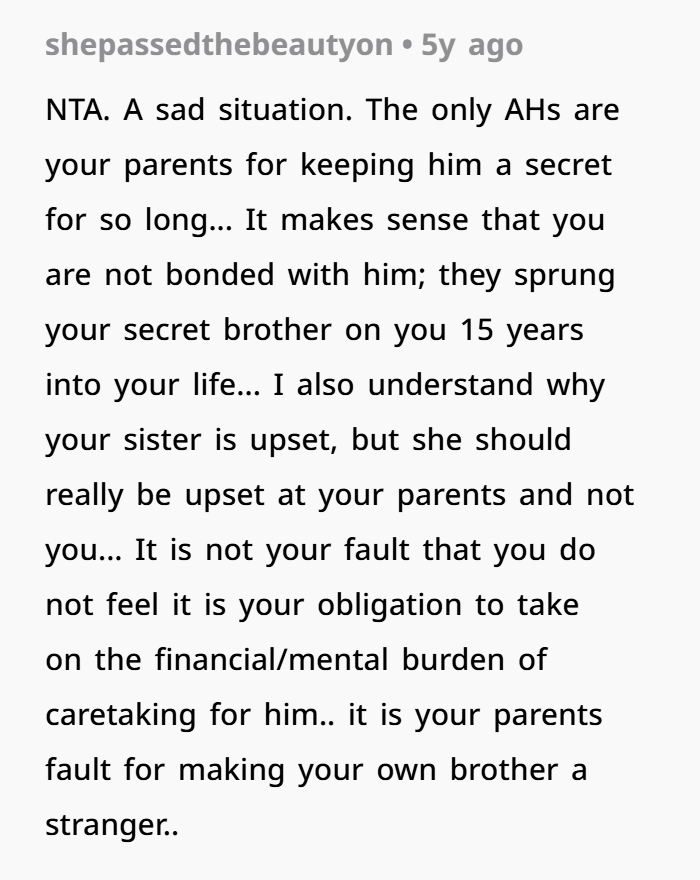
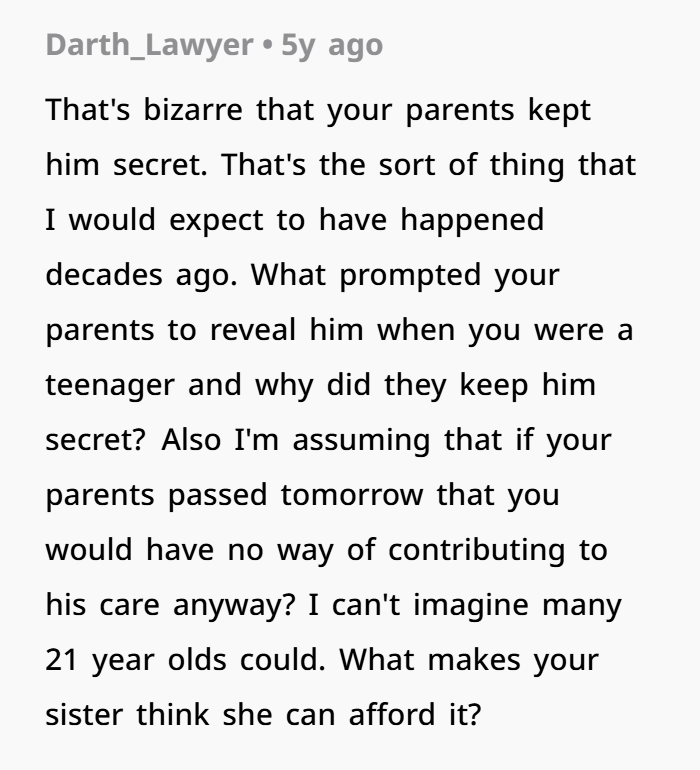
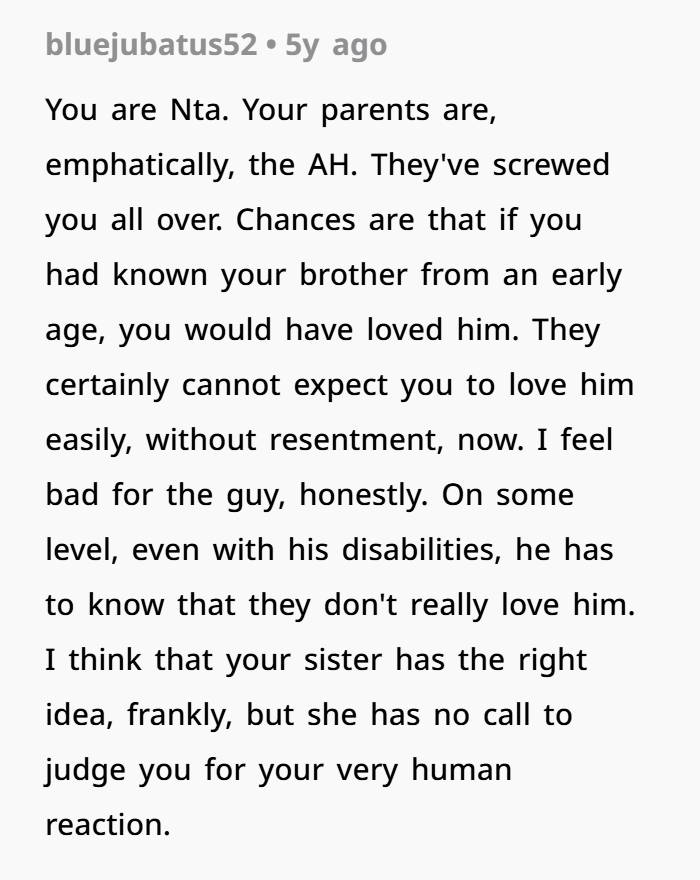
OP isn’t cruel, just realistic. His parents built this dynamic — not him. They excluded their disabled son from family life, then suddenly expect their other children to fix it later. OP’s refusal isn’t heartless — it’s a rational reaction to an impossible situation.
His sister’s compassion is admirable, but her anger is misplaced. The responsibility to secure their brother’s future lies with their parents — and thankfully, they understand that.

